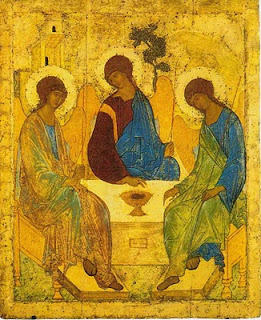
As I discovered in my youth, the Missouri-Synod Lutherans deliberately cultivate a Benedictine spirituality amongst their membership. I initially came into contact with the ancient Liturgy of the Hours in Herbert Lindemann, ed.,
The Daily Office, subtitled, “Matins and Vespers, Based on Traditional Liturgical Patterns, with Scripture Readings, Hymns, Canticles, Litanies, Collects, and the Psalter, Designed for Private Devotion or Group Worship” (St. Louis: Concordia, 1965). I purchased this little volume at the bookstore of Luther Seminary in St. Paul, Minnesota, back in 1978. In recent weeks I have been praying through this book:
Treasury of Daily Prayer, also published by Concordia two years ago. This was on the recommendation of the
Rev. Paul McCain, the Publisher at Concordia and former
Evangel blogger. Unlike the earlier book, this one is huge, taking up 1,500 pages, which means it does not travel easily. At this point I plan to use this resource for one year, after which I will write a review. The Concordia website includes a
preview.
For now I will note two things. First, musical settings for the prayer offices are included, which would be wonderful for use in a community devoted to this form of prayer, albeit less appropriate for personal private prayer. Second, each day is assigned an Old Testament and a New Testament lesson. The OT readings for the season after Easter are from the Pentateuch, and I have noticed that they tend to focus on some of the harsher elements within those first five books, such as the death of Aaron's sons (Leviticus 10:1-20), punishments for sexual transgressions (Lev. 20:10-16) and the punishment for blasphemy (Lev. 24:10-16). Given my belief that all of scripture is God's word, I have no objection to the inclusion of such passages in what is effectively a one-year lectionary. Yet given the confessional Lutheran emphasis on the tension between
law and gospel, I cannot but wonder whether the selection of readings is part of a larger agenda. I suspect I will know once I've made my way through more of the readings.
I wish that more Reformed Christians would adopt something of this pattern of Benedictine daily prayer and that our churches would publish their own resources for this. Tapping into this ancient pattern would greatly enrich our practice of prayer.


